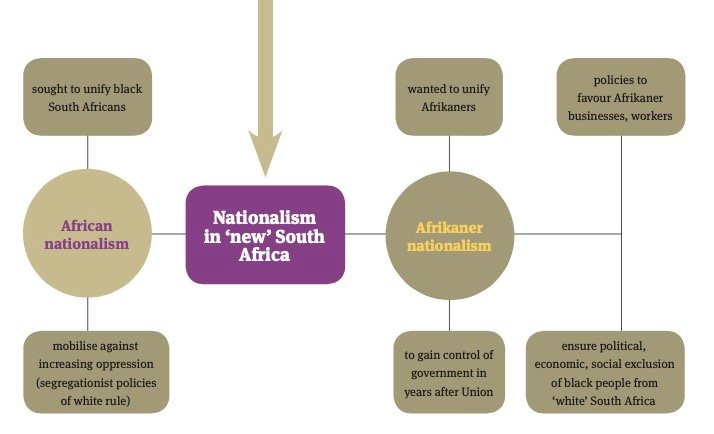JOIN OUR WHATSAPP GROUP. CLICK HERE
The rise of Afrikaner and African Nationalism Essay Grade 11 Guide
The rise of Afrikaner and African Nationalism Essay Grade 11 Guide You may learn a lot about “The emergence of Afrikaner and African Nationalism” on this page, which will be a huge help to you as you study for your Grade 11 History class. Most of the significant happenings and turning points are discussed on this page.
Afrikaner and African Nationalism Grade 11 Essay Key Points
British Colonies in South Africa
- No South Africa before 1910
- Britain defeated Boer Republics in South African War (1899–1903)
- Four separate colonies: Cape, Natal, Orange River, Transvaal colonies(which are ruled by Britain and needed support of white settlers in colonies to retain power).
Union of South Africa
- In 1908, 33 white delegates met behind closed doors to negotiate independence for Union of South Africa
- Views of 85% of country’s future citizens (black people) not even considered.
- British wanted investments protected, labour supplies assured: agreed to give political/economic power to white settlers
- Union Constitution of 1910 placed political power in hands of white citizens
Cape Province
- small number of educated black, coloured citizens allowed to elect few representatives to Union parliament
- only whites had vote
New Nation
- settler nation’ = no room for blacks with rights
- white citizens called selves ‘Europeans’
- all symbols of new nation = European, e.g. language, religion, school history
- African languages, histories, culture seen as inferior
Racism in the new nation:
- Africans seen as members of inferior ‘tribes’
- could practise traditions in ‘native’ reserves
- in settler (white) nation = required only as workers in farms, mines, factories owned by whites
- black people denied political rights, cultural recognition, economic opportunities.
1910 → large numbers of black South African men forced to become migrant workers on mines, factories, expanding commercial farms.
1913 Natives Land Act → worsened situation: land allocated to black people by Act = largely infertile, unsuitable for agriculture.
Land Act, segregation policies (including in work and economy) and World economic depressions (Great Depression that started in USA) resulted in forced migration of people (blacks and white) in South Africa in the 1920s, 30s, 40s. 1 000s of poor white + black tenant farmers forced off land, into cities:
– some = domestic workers/worked in industry
– did not have such strong ties to old rural/ethnic identities
– two forms of nationalism emerged in SA: African Nationalism and Afrikaner Nationalism

JOIN OUR TELEGRAM CHANNEL. CLICK HERE




Be the first to comment